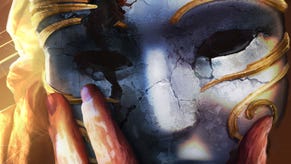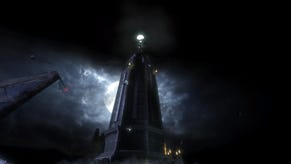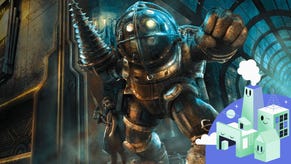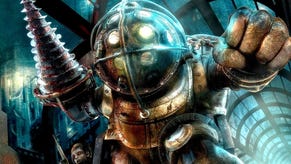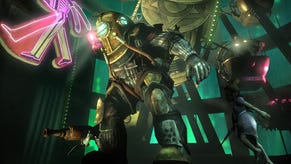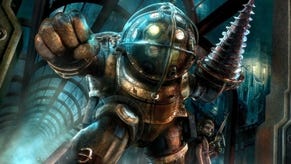BioShock: A Defence
Would you kindly quit your whining?
"YOU CAN WRENCH, DIE, RESPAWN, REPEAT THROUGH THE GAME."
In other words, it's too easy. They've got a point.
That said, the actual quoted argument doesn't really. On the surface, sure, but on closer examination it falls apart. Sure, if you abuse the Vita Chambers in such a way, eventually you'll complete the game. But why the hell would anyone want to do that? It's like noting you can hit Level 60 in World of Warcraft by just farming the lowest-level creature that gives you XP at any point. No risk to yourself, and you'll get there. Of course, it'll take bloody forever, in the same way our wrench/die/respawner does. The alternate in a relatively freely structured level game like BioShock - quicksaves - still means that any challenge in pretty much every game will be eventually overcome through growing player knowledge of the situation. In fact, in a normal play-through, the Vita Chambers mostly work fine. I'd have preferred them a little less common to make them more of a encouragement to stay alive, but...
The actual punishment is you losing the resources you spent in the engagement before dying. And it's here the game actually gets too easy. Or rather, can get too easy. I was going to start this piece with a line that this is this year's Oblivion - i.e. a relatively thoughtful game that was hailed by critics (and gamers, frankly) on release but a backlash grew... especially when they realised how its balancing was so easy to knock out of whack.
That's the problem with BioShock, to a lesser degree. It only sunk in when I was chatting to Dave McCarthy about it. He didn't really like BioShock and claimed he played through with just the pistol. Which made me blink - because I was constantly scavenging for ammo, working out what I should be using, being forced into unusual tactics due to a temporary shortage and planning routes to go and manufacture the right rounds, right to the final levels. And, frankly, Dave isn't that much better a gamer than I. I thrashed him at Naked War, though he's better at SingStar and has a very impressive Brain Training 20-sums time.
Talking further revealed the difference in play-through. It was the research. He'd researched everything as much as he could, pretty much as soon as he'd got the camera. I'd barely touched the thing, only doing a little when I first met a new monster and a little more if one of the baddies was proving too resilient (the Leadheads, primarily). Since most research gives a damage boost, he needed less ammo to kill people, which fed back into him using less ammo, so filled his ammo reservoirs and he could stick with his handy pistol. Meanwhile, I was enjoying myself scavenging and thinking because I had to. Dave's surfeit of resources presumably only made the Vita Chamber deaths - and the loss of resources before going back - even more negligible.
Of course, this is a fault in BioShock. But it's not a fault which you will necessarily hit, and it's a fault that's far more easy to avoid than the equivalent unbalancing in Oblivion. Just don't go crazy with the camera.
(And while we're at it, remember if you do research cameras to max you don't need to hack them anymore, if you want to sidestep the whole hacking game.)
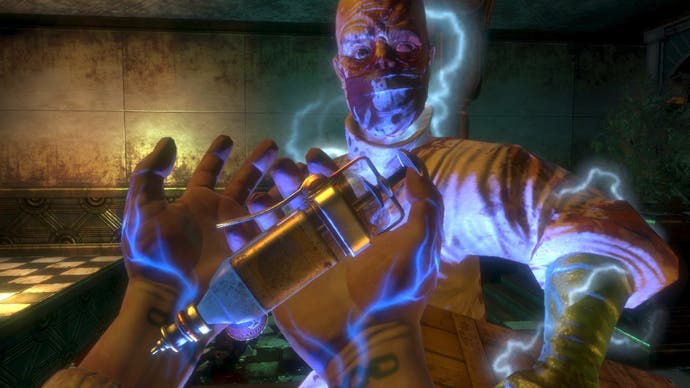
"IT'S TOO REPETITIVE."
This is a handful of associated points. It's partially a side effect of the research issue, partially the result of a psychological quirk of many gamers and partially a fact there's not that many distinctive bad people.
The first part's simple: When you find a tactic that works, many people stick with it. If they've got too many resources, there's not necessarily a need to experiment so they stick with it. And the game, logically enough, becomes really bloody repetitive.
The second part's a little more complicated: I think some designers believe that players like to do interesting things in-game. BioShock is based around that - in that you're given a wide toolset, with lots of weapons and approaches and ways to improve your character and an environment to beat the baddies up with. Go have fun, says BioShock. But players aren't all - in fact, I suspect most aren't - wired to have fun in a world just because the tools are neat. They need to be pushed into doing neat things. Even if you haven't an excess of ammunition, there's simpler methods to taking people out rather than the more amusing ones. So they do them, and the game's repetitive.
This reminds me of Invisible War's air vents. Invisible War actually had a really rich set of possibilities of things you could do to get around problems. Problem was, there was mostly also a handy air vent. Rather than playing with the other things they could do, most players would just go down the vents, then complain they were spending all their time in vents. Because most players would rather be efficient than have fun. This is just the way many of us are wired, it seems.
The third part is entirely fair. Which BioShock's baddies have a lot of personality, and Splicers - even when they act the same - tend to be individualised considerably. But in terms of what they get up to, there's not that many sorts to deal with. Shame. My personal wish for the patch would have be the two other in progress-big daddy's put in.
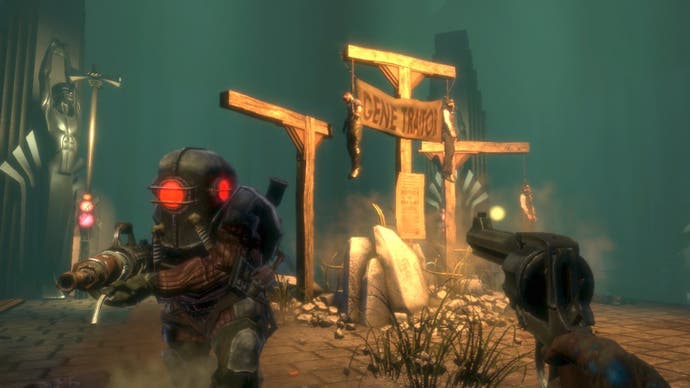
"THE FINAL THIRD GOES DOWNHILL."
While critics can't seem to agree where BioShock is at its best - they seem divided between the opening section and the middle third, depending on their inclinations - pretty much everyone seems to think it never recovers from the perfect f***-you moment. You've had the limitations of your existence exposed - and then, with this knowledge, you continue much the same as before, in less inspired levels. There's some truth to this. While it doesn't quite regain the intensity it previously managed, it does include some of the game's best-conceived sections (The Little Sister's indoctrination centre in the last level proper is on par with Fort Frolic, in terms of note-perfect conceptualisation). And - fundamentally - what it shows is absolutely essential to the narrative arc of BioShock.
The game's basically divided into three, broad sections. The first third is the introduction to the world of Rapture. Here, you're lobbed into this world gone mad at the bottom of the sea, progressing through an example of how the three pillars of the society have decayed. You'll have noticed Science, Industry and Art being the three inscriptions as you enter the bathosphere for the first time - which neatly ties into the medical lab, the fisheries and the debased stage-show of Fort Frolic. This is the world. This is how it is. The middle third, broadly speaking, is about your character. Who you are, what you're doing and - eventually - how you're being controlled. You're a slave, a meat-puppet murderer guided by a nihilistic force. Clearly, this grates. You want to get out of that.
The final third, primarily, is about how this is as true for everyone else in Rapture as you, one way or another. You move from the personal nature of control to how a society has been manipulated. The training of the Little Sisters - best personified by the Pavlovian electric shock machine that rewards you for rejecting the silhouette of a woman in favour of the hulking Big Daddy shape - is obvious enough, but how Fontaine manipulated society into revolt in his favour is key. Your first sight in Fisheries is a man strung up and torn apart, with the grim sign "Smuggler" to warn off anyone trying something similar. Looking at the discarded suitcase reveals what the contraband was - Crucifixes and bibles. People killed for trying to express faith? What manner of monster is Ryan? Except that's reversed in the final third. Fontaine's charities were everything that Ryan feared and loathed, using the cover of altruism to gain a power base and willing servants. After the final third, the nature of Rapture is made perfectly clear - Ken Levine's point of unquestioningly following any pre-set belief system being not the smartest thing in the world is made precisely.
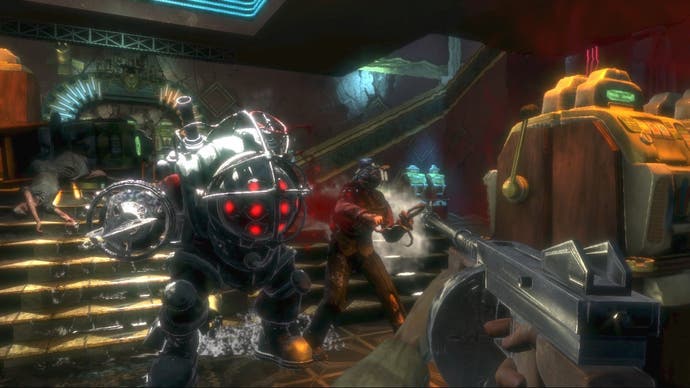
It also picks up on the Meta level. You being programmed to kill on order is a critique of every linear shooter the world has ever seen. The final third widens it to everyone else - if you're stuck in a videogame, so is everyone else and... well, that's a really horrible thing. Even the (inevitable, in retrospect, but I was laughing at myself when I didn't see it coming) Protect The Little Sisters Escort sequence, if you've been following the fiction, has a resonance. Of course the girls are going to stop by each corpse. They can't help themselves, and your awareness of how they're trapped makes you falling into the role of protector make a lot of sense - you're fighting, on both levels, to end this videogame. Hell, you could expand that to the final uninspired boss sequence - this is what we're trying to get away from.
Even that has merits which are being glossed over in the "it's just crap" response. There's the incredible visual reference - Atlas becoming Atlas from the cover of the most famous edition of Ayn Rand's novel - and the final image of the nihilist disappearing beneath a wave of syringe-wielding little girls is incredibly right. Even at its lowest ebb, BioShock has something worth talking about.
The truest critique of BioShock is that while it openly ridicules FPS conventions, it never finds a way from it. I'd say, so what? The argument needed to be posed, and BioShock is the first-person gamer working through its awkward adolescence. Hell, that it capitulates to the genre while seething at it probably might even make it some kind of gaming equivalent to Adaptation...

